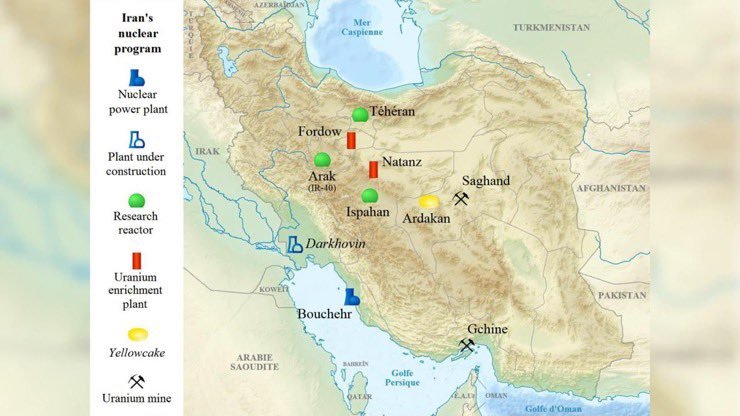Unilateral Action, Global Fallout: Following months of escalating rhetoric, Israel’s unilateral strikes on Iranian nuclear and military targets have sparked a global crisis. While the U.S. denies involvement, the attacks have triggered a sharp rise in oil prices, dipped global stock markets, and left the Middle East bracing for Iran’s “harsh and decisive” response.
BY PC Bureau
January 13, 2025: – Israel has launched a series of preemptive military strikes targeting Iran’s nuclear infrastructure, including the key uranium enrichment facility at Natanz, escalating tensions in the Middle East and threatening to derail ongoing U.S.-led diplomatic efforts to curb Iran’s nuclear program. Israeli Prime Minister Benjamin Netanyahu announced the operation, dubbed “Rising Lion,” in a televised address, stating that the strikes aim to neutralize Iran’s nuclear capabilities and will continue “for as many days as it takes” to eliminate the perceived existential threat to Israel.
Details of the Strikes
The Israeli Defense Forces (IDF) conducted airstrikes on dozens of nuclear and military targets, including Natanz, a critical site for Iran’s uranium enrichment, as well as ballistic missile factories and key personnel. Netanyahu claimed the operation targeted Iran’s “nuclear weaponization program” and leading nuclear scientists, with reports confirming the deaths of two Iranian scientists, Fereydoun Abbasi and Mohammad Mehdi Tehranchi, and the head of the Islamic Revolutionary Guard Corps (IRGC), General Hossein Salami.
Iranian state media reported explosions in Tehran and at Natanz, with visuals showing black smoke rising from the facility. The strikes also hit IRGC headquarters in the capital, and Iranian media reported civilian casualties, including children in a residential area. Iran’s air defense systems were placed on high alert, and the country’s fighter jets were scrambled to intercept Israeli warplanes.
An Israeli military official, speaking to Reuters, claimed Iran possesses enough enriched uranium to produce 15 nuclear bombs within days, though U.S. intelligence assessments differ, stating that Iran has not yet moved to weaponize its nuclear program despite its advanced enrichment capabilities.
Iran’s Press TV has shared a video of fire from a site that it said is the Natanz nuclear facility in central Iran, claiming it was hit by the Israeli strikes.
Israel on Friday announced that it struck Iranian nuclear targets to block Tehran from developing nuclear weapons,… pic.twitter.com/xAYjG9jm8G
— Maktoob (@MaktoobMedia) June 13, 2025
Israel’s Rationale and State of Emergency
Netanyahu described the operation as a critical step to prevent Iran from acquiring nuclear weapons, which he called a “clear and present danger” to Israel’s survival. He accused Iran of planning to arm its regional proxies with nuclear capabilities, posing a global threat. Israel declared a state of emergency, closing Ben Gurion Airport and restricting civilian activities, anticipating retaliatory missile and drone attacks from Iran. Defense Minister Israel Katz warned of an “expected missile and UAV attack” in the immediate timeframe, with air defense units on high alert.
READ: Air India Crash: The Lives and Legacy of AI171’s 12 Brave Crew Members
U.S. Involvement and Response
U.S. Secretary of State Marco Rubio, also serving as National Security Adviser, stated unequivocally that the United States was not involved in the strikes. “Tonight, Israel took unilateral action against Iran. We are not involved in strikes against Iran, and our top priority is protecting American forces in the region,” Rubio said in a White House statement. He warned Iran against targeting U.S. interests or personnel and confirmed that the Trump administration is taking measures to safeguard American forces while maintaining close contact with regional partners.
Israel launches “Operation Rising Lion,” striking Iran’s nuclear & military sites.
Explosions in Tehran, top officials reportedly killed. Israel declares emergency, Tel Aviv airport shut.
Iran vows revenge, closes airspace with Iraq. US denies involvement, warns Iran. pic.twitter.com/09jKyFEOpW
— Treeni (@TheTreeni) June 13, 2025
President Donald Trump convened a National Security Council meeting on Friday morning to address the crisis. Despite earlier optimism about nuclear negotiations, Trump expressed skepticism about Iran’s intentions, stating on Wednesday that Tehran was “delaying” talks. He reiterated his commitment to diplomacy, posting on social media, “My entire Administration has been directed to negotiate with Iran. They could be a Great Country, but they first must completely give up hopes of obtaining a Nuclear Weapon.”
 READ: Air India Crash: Jamie Ray’s ‘Goodbye India’ Video Haunts the Internet
READ: Air India Crash: Jamie Ray’s ‘Goodbye India’ Video Haunts the Internet
U.S. intelligence had previously warned of Israel’s preparations for a potential strike, with officials noting that Israel might act unilaterally if nuclear talks faltered. The strikes have deepened a divide between U.S. and Israeli intelligence assessments, with Israel taking a more alarmist view of Iran’s nuclear intentions.
Iran’s Response and Regional Implications
Iran vowed a “harsh and decisive” response, with a senior security source telling Reuters that retaliation plans were being discussed at the highest levels. General Shekarchi, a spokesperson for Iran’s armed forces, warned that “Israel and the United States will receive a forceful slap.” Iran’s Supreme National Security Council claimed to possess extensive intelligence on Israel’s nuclear infrastructure, threatening counterstrikes on Israeli nuclear sites if attacked further.
The strikes have disrupted scheduled U.S.-Iran nuclear talks mediated by Oman, set to resume on Sunday. The talks, now in their sixth round, have stalled over Iran’s insistence on retaining uranium enrichment rights for civilian purposes and U.S. demands for a complete halt. Iran’s Foreign Ministry denied reports of a potential pause in enrichment in exchange for sanctions relief, signaling continued deadlock.
Economic and Global Impact
The strikes triggered a sharp rise in crude oil prices, climbing 8.3% to $73.75 per barrel, marking the largest single-day increase since March 2022. Global stock markets dipped as investors sought safe-haven assets amid fears of a broader regional conflict. The International Atomic Energy Agency (IAEA) is monitoring radiation levels at Natanz and other targeted sites, confirming the facility’s involvement but noting uncertainty about the extent of damage.
Political Reactions
The Israeli action has sparked mixed reactions in the U.S. Senate Majority Leader John Thune emphasized protecting American troops and civilians, warning Iran against retaliation. Conversely, Senator Jack Reed criticized the strikes as a “reckless escalation,” urging Trump to pursue diplomatic de-escalation. Senator Chris Murphy accused Israel of undermining Trump’s negotiations, suggesting the move reflects a lack of respect for U.S. leadership.
Context and Ongoing Tensions
The strikes follow months of friction between Israel and the Trump administration over Iran policy. Netanyahu has repeatedly pushed for military action, citing Iran’s enrichment of uranium to 60% purity, close to weapons-grade levels. Trump, while open to military options if talks fail, has prioritized diplomacy, a stance that has frustrated Netanyahu, who views any enrichment capability as unacceptable.
Iran denies seeking nuclear weapons, asserting its enrichment program is for civilian purposes under the Nuclear Non-Proliferation Treaty. However, the IAEA’s recent condemnation of Iran’s non-compliance and its resolution against Tehran—the first in 20 years—have heightened international scrutiny.
As the situation unfolds, the Middle East braces for potential escalation, with global attention focused on Iran’s response and the viability of diplomatic efforts to prevent a broader conflict.














